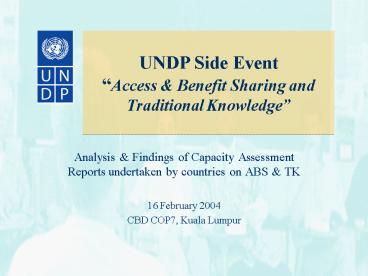UNDP Side Event Access PowerPoint PPT Presentation
1 / 12
Title: UNDP Side Event Access
1
UNDP Side EventAccess Benefit Sharing and
Traditional Knowledge
- Analysis Findings of Capacity Assessment
Reports undertaken by countries on ABS TK - 16 February 2004
- CBD COP7, Kuala Lumpur
2
Overview of Capacity Assessments
- Under the UNDP/GEF Biodiversity Enabling
Activities, Country Capacity Assessments on TK
and ABS have been received from 13 countries,
including - 8 Assessments of TK Benin, Bolivia, Grenada,
Guinea, Iran, Mali, Niue, and the Philippines - 5 Assessments of ABS Armenia, CAR, El Salvador,
Sudan, Zimbabwe (now also Samoa) - A comparative analysis was undertaken in Oct-Dec
2003 to assess common capacity concerns
identified by these countries, as well as to
identify the best practices and experiences
generated within countries.
3
Key Areas for Capacity Building
- Capacity building aspects identified by countries
have been categorized within four broadly related
themes - Access to genetic resources
- Conservation and management of genetic resources
- Benefit sharing
- Traditional knowledge
4
Findings Access to Genetic resources
- Awareness/valuation programmes focusing on the
need to increase awareness of stakeholders and
policy makers about the value and potential
benefits of biodiversity - Stakeholder participation recognizing that
stakeholder participation is insufficient at
present and needs to be enhanced through
awareness raising, capacity building, and through
an emphasis on trust and transparency
5
Findings Access to Genetic Resources (contd)
- Regulatory coordination there is a need to
address overlapping jurisdictional mandates and
develop mechanisms for effective coordination - Establishing procedures and institutions to
process requests for access and Free Prior
Informed Consent - Training for government officials, policy-makers
and various stakeholders on ABS
6
Findings Conservation Management of Genetic
Resources
- Awareness/valuation programs seen as an important
means of stressing the importance of conservation
of genetic resources - Genetic resource inventory the lack of a
comprehensive survey and inventory of genetic
resources has made it difficult for many
countries to assess the status of genetic
resources including their utilization, which has
impeded the formulation of genetic
resource-specific access policies
7
Findings Conservation Management of Genetic
Resources (contd.)
- Taxonomic resources Improved training of customs
officials in species identification, as well as
improved capacity of research organizations to
classify genetic resources. - Conservation infrastructure to enhance the
capacity to improve conservation and management
efforts for protected areas - Resources/staffing Government and ancillary
organizations (e.g. gene banks and research
organizations) may lack adequate resources and/or
adequate staffing
8
Findings Benefit Sharing
- Legislative frameworks there is a need to draft
and implement laws regulations on equitable
benefit sharing - Stakeholder participation countries have
emphasized the need to ensure stakeholder
participation in the management and use of
natural resources
9
Findings Benefit Sharing (contd.)
- Inclusion of communities surrounding PAs in
sharing the benefits derived from PA resources - Bioprospecting countries have recommended
development of model agreements as a short term
measure with drafting of legislation in the
long-term - Model agreements countries have recognized that
most model agreements are created on a
case-by-case basis and standard procedures still
need to be established for FPIC and equitable
sharing.
10
Findings Traditional Knowledge
- Awareness/valuation programs Countries have
identified the need to properly value TK as a
means to empower indigenous and local communities
in negotiating contracts with collectors and
developers - Legislative framework Most countries have
identified a need to create a legislative
framework to protect TK that is separate from
traditional intellectual property regimes
11
Findings Traditional Knowledge (contd.)
- Training Countries have identified a need for a
focal point for communications with indigenous
and local communities, and for such focal points
to undergo cultural sensitivity training and
legal training in TK - Incorporating TK into development Some
countries have indicated the need to bring TK
into development projects and plans in order to
enhance sustainability and increase the prestige
afforded TK, thereby helping to appropriately
value TK
12
Next Steps and Future Actions
- Undertake a more comprehensive analysis as more
country assessments become available in coming
months. - Consider how the lessons and best practices
identified in country assessments could be
exchanged among countries. - Integrate capacity building concerns identified
by countries into ongoing activities and in the
design of planned projects and activities.

